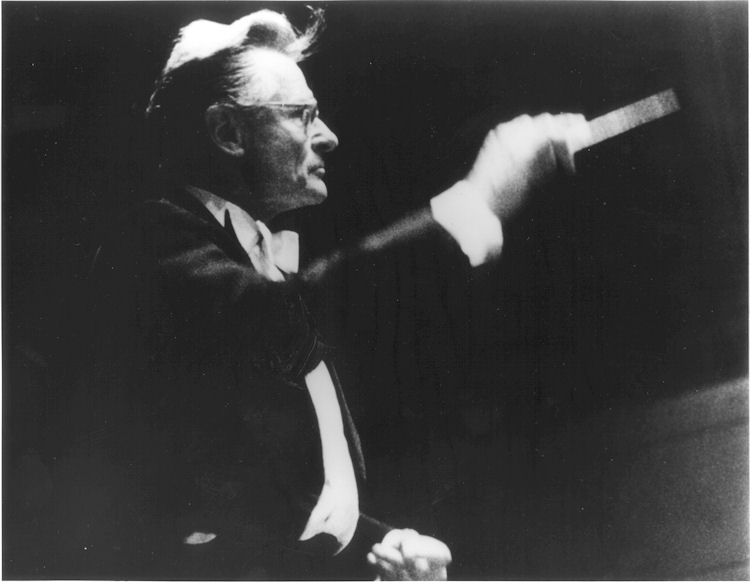

| Stanisław Skrowaczewski retains
a unique position on the international musical scene, where he is both
a renowned conductor and a highly regarded composer, especially of
large-scale orchestral works. Recognized as the preeminent Bruckner
interpreter of his times, his interpretations have
earned him the Gold Medal of the Mahler-Bruckner Society. He has also
received the "Commander Order with White Star," the highest order
conferred by the Polish Government, the 1973 Ditson Conductor's Award,
and the 1976 Kennedy Center Friedheim Award. Born in Lwow, Poland on October 3, 1923, Skrowaczewski began piano and violin studies at the age of four, composed his first symphonic work at seven, gave his first public piano recital at 11 and two years later played and conducted Beethoven's 3rd Piano Concerto. A hand injury during the war terminated his keyboard career, after which he concentrated on composing and conducting. In 1946 he became conductor of the Wroclaw (Breslau) Philharmonic, and he later served as Music Director of the Katowice Philharmonic (1949-54), Krakow Philharmonic (1954-56) and Warsaw National Orchestra (1956-59). Skrowaczewski spent the immediate post-war years in Paris, studying with Nadia Boulanger and co-founding the avant-garde group "Zodiaque". After winning the 1956 International Competition for Conductors in Rome he was invited by George Szell to make his American debut conducting the Cleveland Orchestra in 1958. This led to engagements with the New York Philharmonic, Pittsburgh and Cincinnati Symphonies and, in 1960, to his appointment as Music Director of the Minneapolis Symphony Orchestra (now the Minnesota Orchestra). Skrowaczewski has regularly conducted the major orchestras of the world as well as the Vienna State Opera and the Metropolitan Opera. He has made international tours with the Concertgebouw, French National, Warsaw and Hamburg orchestras, and twice toured the Philadelphia Orchestra to South America and the Cleveland Orchestra to Australia. From 1984-91, following 19 years as Music Director of the Minneapolis Symphony, he was appointed Principal Conductor of the Hallé Orchestra. With the Hallé he gave concerts throughout England, led tours to the United States, Germany, Austria, Switzerland, Scandinavia, Spain and Poland and recorded for RCA, Chandos and Pickwick/Carlton. Beginning with his Overture 1947, which won the Szymanowski Competition in Poland, many of Skrowaczewski's works have received major international awards. Among his most recent compositions are his Symphony, premiered in 2003 by the Minnesota Orchestra, the Concerto for Orchestra, shortlisted for a Pulitzer Prize in 1999 and his Violin Concerto, commissioned and premiered by the Philadelphia Orchestra. Earlier works performed by major European and American orchestras are the Concerto for Clarinet, Concerto for English Horn and Ricercari Notturni, recipient of a Kennedy Center Friedheim Award in 1976, and at the end of 2009 his latest composition Concerto for Winds will be premiered by the Deutsche Radio Philharmonie and Bayerische Rundfunk orchestras. Skrowaczewski's interpretations of the Bruckner symphonies have earned him the Gold Medal of the Mahler-Bruckner Society, whilst his programming of contemporary music at the Minnesota Orchestra has been acknowledged by five ASCAP awards. An extensive discography includes recordings for RCA, Philips, CBS, Denon, EMI/Angel, Mercury, Vox, Erato, Muza, Arte Nova and Oehms Classics. Many celebrated earlier recordings have been re-released on CD and his digital recordings of Shostakovich, Brahms and particularly Bruckner have received highest praise. Skrowaczewski's recordings of Bruckner's 11 symphonies and Beethoven's 9 symphonies with the Saarlændischer Rundfunk Orchestra for Arte Nova have received enormous critical acclaim, with the Bruckner receiving the Cannes 2002 Award for Best Orchestral Recording of 18th/19th Century Orchestral Work. Other recent releases include Shostakovich's First and Sixth Symphonies with the Halle Orchestra on their own label and Shostakovich’s Tenth Symphony with the Deutsche Symphonie Orchester Berlin, recorded live in concert in 2003. Guest engagements now take Skrowaczewski across North and South America, Europe and Japan. Skrowaczewski is currently the Conductor Laureate of the Minnesota Orchestra, Principal Guest Conductor of the Deutsche Radio Philharmonie (formerly Saarbrucken Radio Symphony Orchestra) and Principal Conductor of the Yomiuri Nippon Symphony Orchestra in Tokyo. Stanisław Skrowaczewski is represented by Intermusica. |
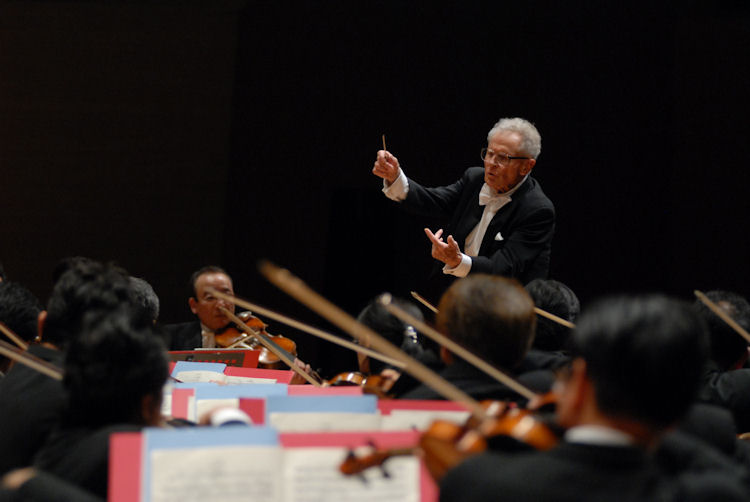 BD: Is this kind of a
throwback to the old masters
who were conductor and performer and creator and chamber
musician all at the same time?
BD: Is this kind of a
throwback to the old masters
who were conductor and performer and creator and chamber
musician all at the same time?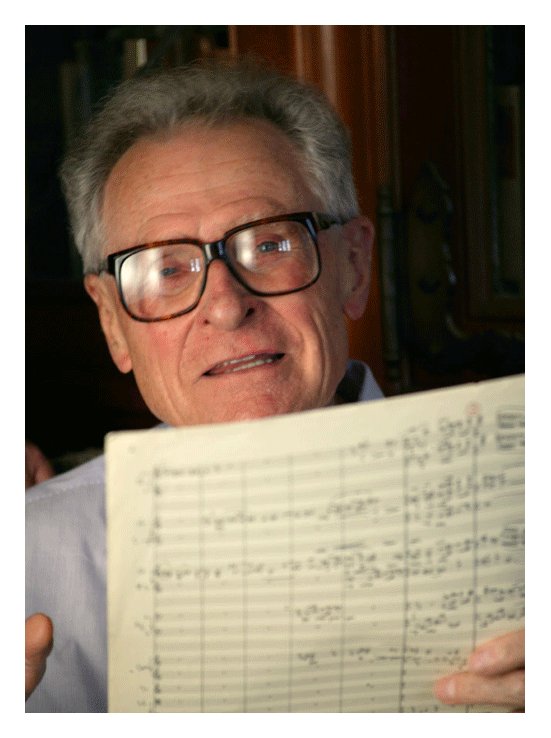 BD: So there is a white
heat of composition?
BD: So there is a white
heat of composition?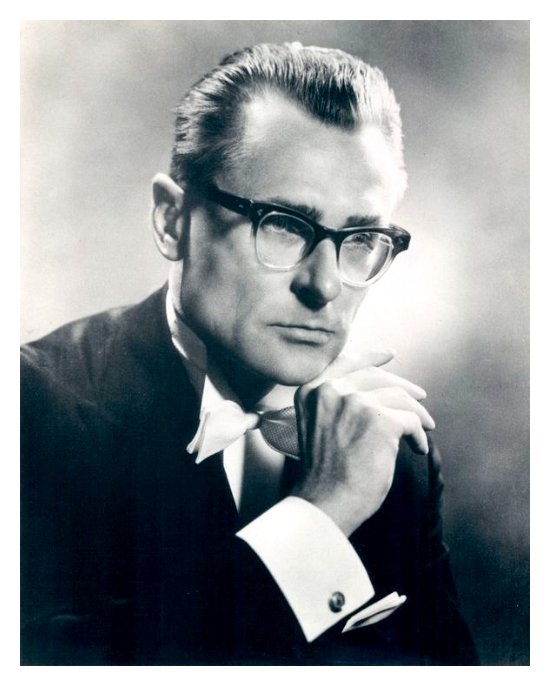 SS: Entertainment is
something very different. Personally, I
cannot mix the art with entertainment. Certain
art certainly is, and produces, entertainment with all the great
possibility of being
very refined to quite vulgar. Art is something that is not
entertainment as such; it is a desire to go beyond ourselves to touch
infinity, to touch the cosmos and all that produced our
curiosity in the universe. In science this is the
same. Now if you use this for simply
entertainment, to get a pleasant moment, certainly any
art will have very beautiful things. If
you touch the beauty, you can feel better and you can entertain
yourself. For example, with poetry you can have a very nice, but
not
profound verse that is quite intelligent, and you will smile and say,
"Oh, how clever, how wonderful." You will enjoy a rhyme and
everything. It is the same with
music! With sounds that are cleverly put together and connected
with a
good performance, with singing, with dancing or
something like that, you can have very pleasant positive
feelings.
To me, it is something that is quite different
from the gist of the art. A part of the art can be for this, but
I don't think it is the real point of the whole wonderful
development of music or painting. There is incredible development
and depth in 19th century music. It is not because people
just needed to be entertained. This was certainly expression of
the deepest human desire to know
something
about ourselves, about our life, about God and religion, anything
connected with philosophy and with all
the ideas about our universe.
SS: Entertainment is
something very different. Personally, I
cannot mix the art with entertainment. Certain
art certainly is, and produces, entertainment with all the great
possibility of being
very refined to quite vulgar. Art is something that is not
entertainment as such; it is a desire to go beyond ourselves to touch
infinity, to touch the cosmos and all that produced our
curiosity in the universe. In science this is the
same. Now if you use this for simply
entertainment, to get a pleasant moment, certainly any
art will have very beautiful things. If
you touch the beauty, you can feel better and you can entertain
yourself. For example, with poetry you can have a very nice, but
not
profound verse that is quite intelligent, and you will smile and say,
"Oh, how clever, how wonderful." You will enjoy a rhyme and
everything. It is the same with
music! With sounds that are cleverly put together and connected
with a
good performance, with singing, with dancing or
something like that, you can have very pleasant positive
feelings.
To me, it is something that is quite different
from the gist of the art. A part of the art can be for this, but
I don't think it is the real point of the whole wonderful
development of music or painting. There is incredible development
and depth in 19th century music. It is not because people
just needed to be entertained. This was certainly expression of
the deepest human desire to know
something
about ourselves, about our life, about God and religion, anything
connected with philosophy and with all
the ideas about our universe.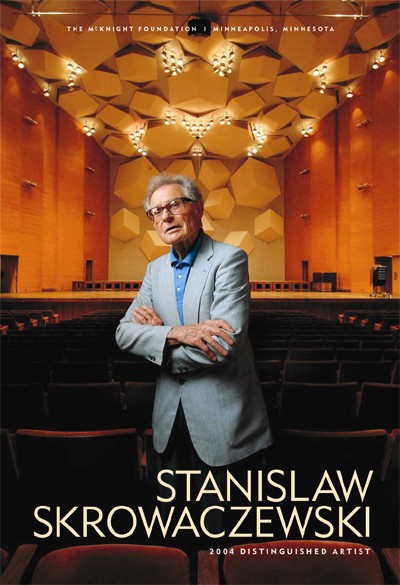 BD: What are the ones
that do interest you?
BD: What are the ones
that do interest you?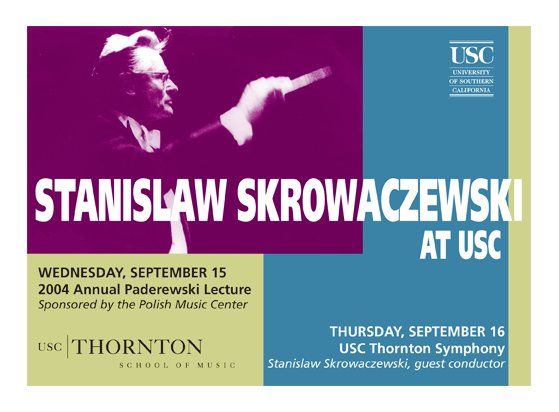 BD: What advice
do you have for the young conductors coming along today?
BD: What advice
do you have for the young conductors coming along today?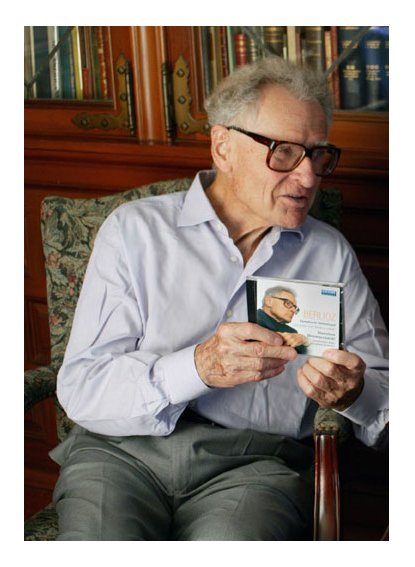 SS: Many things; some
very exciting things next season and a
few things in the summer that are pleasant. I would say all
pleasant things because I don't take things that are not
pleasant.
Why should I? Why should I go and conduct in a place that is not
very high artistically or very
interesting? If I am asked to do something that doesn't
interest me, then I don't go! I am always connected with programs
of quality, and with music that I like to do. It doesn't need to
be just the greatest orchestra in
the world. I find some smaller ensembles here
and there very satisfying with their music-making.
SS: Many things; some
very exciting things next season and a
few things in the summer that are pleasant. I would say all
pleasant things because I don't take things that are not
pleasant.
Why should I? Why should I go and conduct in a place that is not
very high artistically or very
interesting? If I am asked to do something that doesn't
interest me, then I don't go! I am always connected with programs
of quality, and with music that I like to do. It doesn't need to
be just the greatest orchestra in
the world. I find some smaller ensembles here
and there very satisfying with their music-making.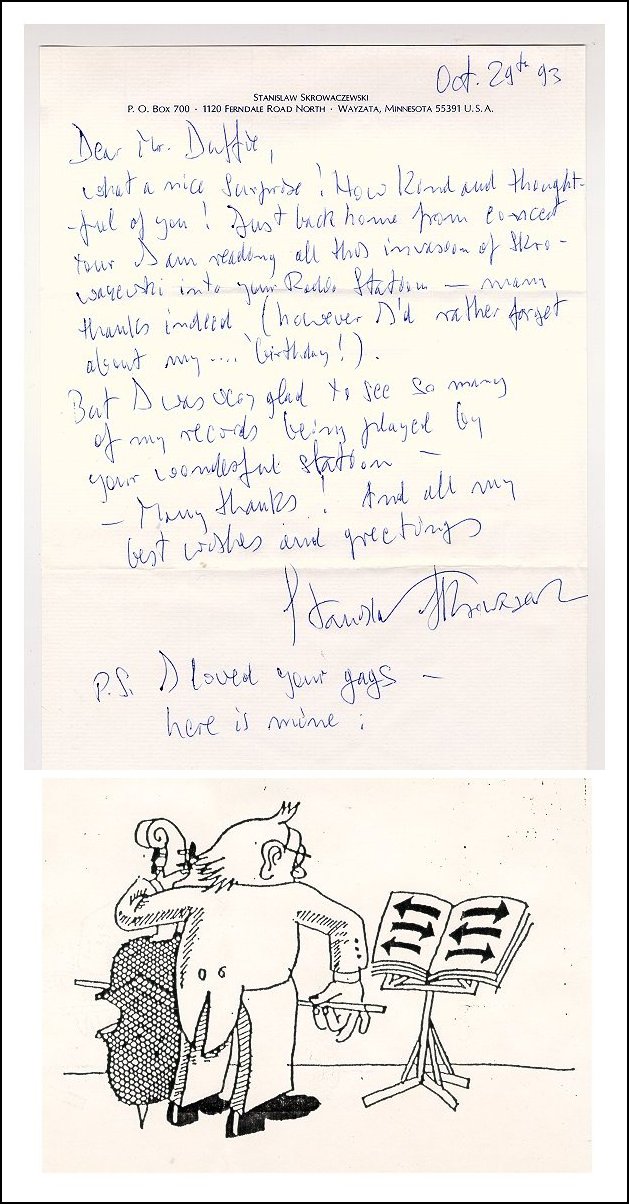
This interview was recorded on the telephone on June 27, 1987. Portions (along with recordings) were used on WNIB in 1988, 1993, and 1998. A copy of the unedited audio was placed in hte Archive of Contemporary Music at Northwestern University. This transcription was made and posted on this website in 2012.
To see a full list (with links) of interviews which have been
transcribed and posted on this website, click here.
Award - winning broadcaster Bruce Duffie was with WNIB, Classical 97 in Chicago from 1975 until its final moment as a classical station in February of 2001. His interviews have also appeared in various magazines and journals since 1980, and he now continues his broadcast series on WNUR-FM, as well as on Contemporary Classical Internet Radio.
You are invited to visit his website for more information about his work, including selected transcripts of other interviews, plus a full list of his guests. He would also like to call your attention to the photos and information about his grandfather, who was a pioneer in the automotive field more than a century ago. You may also send him E-Mail with comments, questions and suggestions.